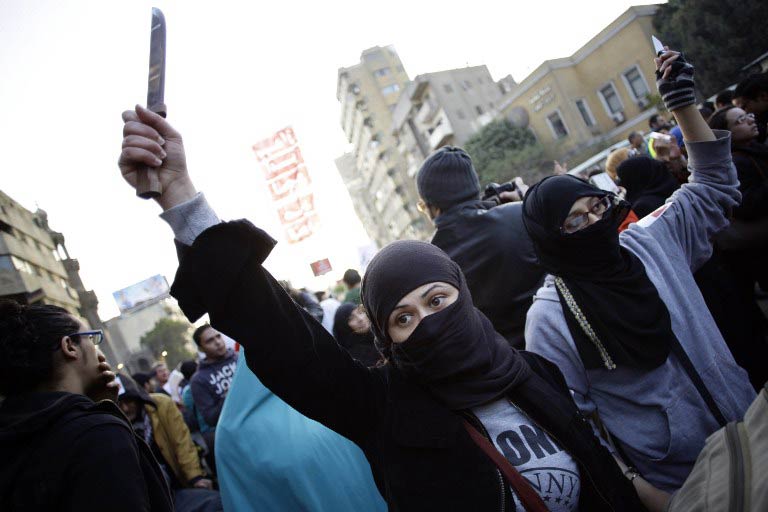The head of Egypt’s leading state university has provoked furious condemnation for claiming that an on-campus sexual harassment case was the fault of its female victim, and saying that she may be punished.
The Cairo University student was surrounded on Monday by a group of male students who sexually harassed her as she walked across a busy campus. The woman was later escorted from the university by campus security, and the incident was filmed by bystanders – many of whom appear unconcerned, or eager to join in – and uploaded to social media.
One male student can be heard saying: “Guys, I’m going to upload it on Facebook – whoever wants to watch this video, come to my page.”
The university’s president, Dr Nasser Gaber, added to public outcry when he told a television talkshow the incident had resulted in part from the woman wearing colourful clothes, instead of a more conservative cloak, or “abaya”‘. He also said that she may face punishment for the incident along with her harassers, and possibly expulsion.
Gaber told OnTV, a private Egyptian network: “The girl took off her abaya inside the university and appeared with those clothes – which was a reason for what happened … we don’t require a uniform here but clothes should be within the tradition of our society.”
He added: “The girl’s mistake doesn’t justify what happened to her at the hands of those students. We referred the whole incident to an investigation and everything is recorded by the university cameras. We will find out who is guilty – whether the girl or the [other] students – and we are going to punish them with the proper punishment, which might be expulsion from the university.”
‘Insanely appalling’
Women’s rights activists reacted furiously to Gaber’s remarks. Soraya Bahgat, the founder of Tahrir Bodyguards, a group that rescues women from mob sexual assaults during protests, said: “I find it insanely appalling that the head of arguably the most important university in Egypt said that her clothes were to blame. It was very alarming – but part of me is glad that this has come out, because it highlights one of the things that is wrong with this society, which is to blame the victim [of sexual harassment] for what happened.”
Following criticism of his remarks, Gaber said he had been misunderstood. “It is clear that a false perception has been generated among some people that I placed the responsibility for what happened on the student,” he told the website of the official state newspaper. “I assure you that this is not true and I apologise for the misunderstanding.

Although Gaber said that the incident was a one-off, sexual harassment is endemic throughout Egyptian society. In the past 18 months many more people have begun to mobilise against it, but sexual harassment still remains an accepted part of Egyptian life. According to a UN survey, 99.3% of Egyptian women reported being sexually harassed, with 91% saying they felt insecure in the street as a result.
Women are frequently blamed for harassment, while the crime is not properly defined under Egyptian law, which makes prosecuting perpetrators difficult. When women try to file complaints under more general harassment and assault laws, their cases are not taken seriously by police, and only there have only been a handful of convictions.

Comments are closed.